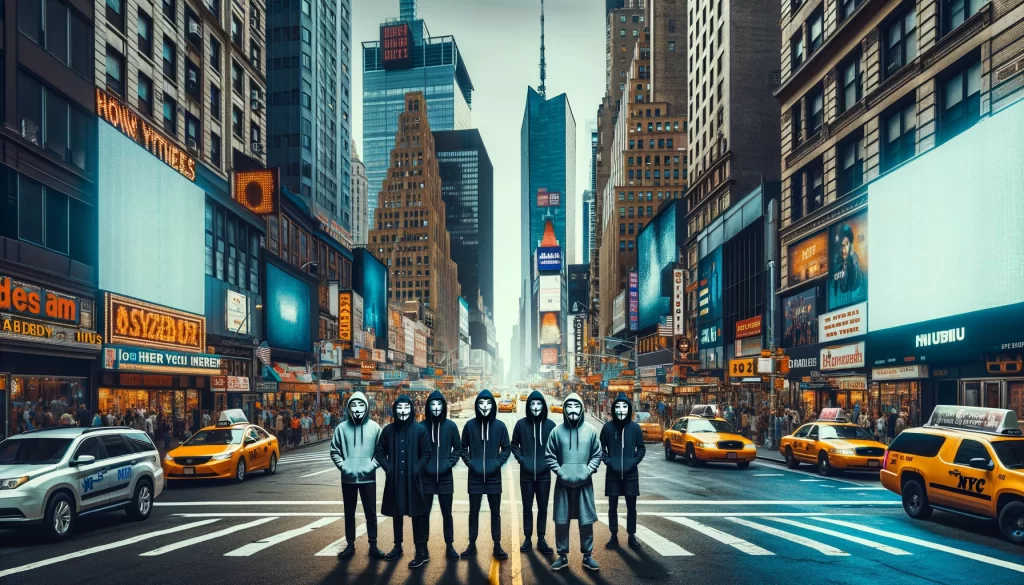The Anonymous Squad, often shrouded in mystery and intrigue, has gained global attention over the years for its high-profile cyber activities. This collective, lacking a central structure or official membership, represents a modern phenomenon at the crossroads of activism, hacktivism, and digital dissent. This article delves into who the Anonymous Squad is, its origins, notable actions, and the ongoing debate about its impact on society and cybersecurity.

Origins and Identity
The origins of the Anonymous Squad trace back to the mid-2000s, originating from online forums such as 4chan. Initially, the group’s activities were primarily for entertainment, embodying the chaotic neutral aspect of internet culture. However, over time, their actions took on a more activist orientation, targeting issues of freedom of speech, privacy, and transparency. The term “Anonymous” reflects the group’s decentralized and faceless nature, allowing anyone to act in its name provided they align with its broad principles.
Notable Actions
Anonymous has been associated with a wide range of digital protests and cyberattacks against government, corporate, and religious targets. Their tactics include distributed denial-of-service (DDoS) attacks, hacking, and doxxing (publicly revealing private information). Some of their most notable campaigns include:
- Operation Payback (2010): A series of attacks on payment processing companies that refused to process donations to WikiLeaks.
- Operation Tunisia (2011): Support for the Tunisian revolution by attacking government websites and providing resources for bypassing censorship.
- Operation Charlie Hebdo (2015): A campaign against jihadist websites following the Charlie Hebdo shooting in Paris, to defend freedom of expression.
These actions, among others, have showcased Anonymous’s ability to mobilize quickly and impact targets globally, leveraging the anonymity and distributed nature of the internet.
Philosophy and Goals
The Anonymous Squad does not have a fixed ideology but is united by common themes of anti-censorship, freedom of information, and opposition to corruption and abuse of power. The group’s decentralized nature means that its actions and goals can vary widely, depending on the individuals or factions involved. This fluid identity allows Anonymous to adapt to various causes, but it also leads to debates about the coherence and ethics of its operations.
Impact and Controversy
The impact of Anonymous is multifaceted. On one hand, the group has brought attention to critical issues, exposed wrongdoing, and challenged powerful institutions. On the other hand, its methods have raised legal and ethical questions. The use of illegal hacking techniques and the potential for collateral damage have sparked debates about the legitimacy and morality of vigilante justice in the digital age.
Critics argue that Anonymous’s actions can undermine the rule of law and infringe on individuals’ privacy and security. Supporters, however, view the group as a necessary counterbalance to state and corporate power, especially in contexts where traditional forms of protest and dissent are suppressed.
The Debate on Cybersecurity
The activities of the Anonymous Squad have significant implications for cybersecurity. On one level, their operations highlight vulnerabilities in digital infrastructures, prompting organizations to strengthen their defenses. Conversely, the tactics employed by Anonymous, such as DDoS attacks and hacking, contribute to a climate of cyber insecurity and can serve as a blueprint for malicious actors.
The debate extends to the ethical dimension of cybersecurity. The line between activism and cybercrime becomes blurred when hacktivism involves illegal activities. This ambiguity challenges legal systems and societal norms to adapt to the complexities of the digital realm.
Future Outlook
The future of the Anonymous Squad is as unpredictable as its origins. The group’s decentralized nature ensures that it can never be fully disbanded or defeated in the traditional sense. As long as there are individuals motivated by its blend of digital activism and anarchic humor, Anonymous will likely continue to make headlines.
However, the evolving landscape of internet regulation, cybersecurity, and digital activism may shape how and where Anonymous operates. Increased surveillance, stronger cybersecurity measures, and changing public opinions about privacy and digital rights could either constrain or galvanize the group’s activities.
Conclusion
The Anonymous Squad embodies the contradictions of the internet age: a force for freedom and transparency that also raises questions about legality, ethics, and security. Its legacy is a reminder of the power of collective action in the digital era and the ongoing struggle to define the boundaries of activism, hacktivism, and cybercrime. As technology continues to evolve, so too will the nature of digital dissent, with Anonymous playing a role in shaping the future of online activism and cybersecurity.